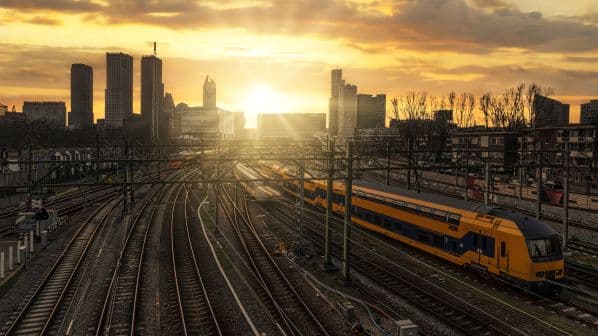NETHERLANDS Railways (NS) says lower passenger numbers due to changing working patterns and a shortage of staff led to an operating loss of €304m in 2022, down from a loss of €952m the year before.
Revenue was €3.06bn in 2022, up from €2.25bn in 2021. The loss was offset by a final €274m “availability” payment from the government to ensure services continued to operate, and a €12m payment through the NOW scheme to cover retail loses during the Covid-19 pandemic. There was also a positive accounting effect of €385m in 2022 due to the partial reversal of the €1.6bn write-down that NS booked in 2020. Including a positive result from discontinued operations in Britain of €54m and a positive net financing result of €178m, the net result for the period amounted to €579m.
Passenger numbers were down in 2022 compared with before the Covid-19 pandemic. Passenger numbers initially increased in March 2022 when the final Covid restrictions, such as the mandatory use of face masks, were removed. However, this growth stalled in the autumn, with passenger numbers for the year 20% lower than pre-Covid.
NS says passenger habits have also changed, with weekends now busier than they previously were. NS is also seeing a peak in traffic on Tuesdays and Thursdays, with quieter trains on Mondays, Wednesdays and Fridays as more commuters work from home.
The results, published on February 23, do not include the activities of Abellio UK. On February 28 NS completed the sale of Abellio UK to a management buyout team, agreed in August 2022, after receiving all the formal approvals required.
The new company, Transport UK Group (TUK), will take over all Abellio UK’s existing rail operations, including East Midlands, West Midlands and Greater Anglia, as well as the Merseyrail operating joint venture with Serco. In the short term, the Abellio brand will remain in operation for parts of the business under TUK.
The financial impact of the pandemic on NS was limited in Germany by the risk of lower revenue being borne by the public transport authorities rather than the operators.
NS’s international operating subsidiary Abellio sought insolvency protection and exited most of its German operating contracts at the end of 2021.
After restructuring and reacquiring operations, NS says Abellio it is showing encouraging results in Germany, but restructuring makes it difficult to compare results for 2022 and 2021. Abellio reported revenue of €256m in 2022, down from €378m the year before, with a net result of €2m compared with a €22m loss in 2021.
Transport revenue for NS in the Netherlands was €2.3bn in 2022, up from €1.54bn the year before. Station operating revenue also increased due to the growth in passenger numbers, rising from €327m in 2021 to €437m in 2022.
In 2022, 91.6% of passengers arrived on time, down from 94.4% in 2021. The percentage of passengers who had a seat during rush hour dropped from 99.6% in 2021 to 96.6% in 2022. On the HSL South high-speed line, 82% of passengers arrived on time, down from 89.2%. This is largely due to a temporary speed restriction introduced on the line at the end of October, a precautionary measure taken during construction of a viaduct near Rijpwetering.
NS introduced its new 2023 timetable on December 11 2022, and says it better reflects new travel patterns. Initial results from January compared with January 2020 are favourable, with the number of overcrowded trains falling from 129 per week to 55.
Outlook
NS says the coming years will remain financially challenging due to high inflation, lower passenger numbers, uncertainty over energy prices and the end of the government availability fee in 2022.
The operator lost €220m between 2020 and 2022 during the pandemic, despite the payment of the availability fee. NS will have to continue borrowing in the coming years to fully finance all operating activities and investment, while debt has already increased by more than €1.18bn to reach €1.8bn in recent years.
In 2020, NS started a programme make savings of €1.4bn by 2024 and has now achieved half of this goal. NS expects the current Main Line Network concession to remain loss-making up to and including 2024. Talks will be held with the Ministry of Infrastructure and Water Management over the terms of a new 10-year concession starting in 2025.
“2022 was a tough and unpleasant year for NS, with September being the low point when NS ran considerably fewer trains due to a shortage of colleagues,” says NS CEO, Mr Wouter Koolmees. “In this we have failed the passenger. It clearly shows how important colleagues are. In December, we launched a new timetable. The first weeks since the introduction of this timetable show positive results.
“Healthy labour relations are the key to successful organisations. Companies will increasingly realise this. Due to the ageing population, the shortage in the labour market will continue in the coming years. Everyone in the Netherlands, employers in particular, will notice this. We want employees to enjoy their work and, as an employer, you have to ensure that employees are deployed where they are needed most. That also applies to NS. We continue to invest in our colleagues in order to keep travellers happy as well.”

